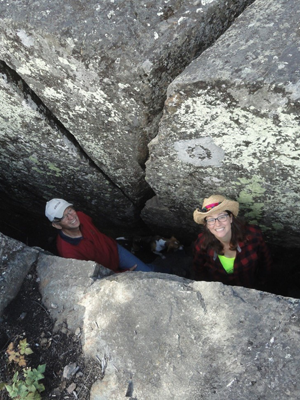Smash the Boardroom Table and Build a Sweat Lodge
Kathryn Eagles – Environmental Protection Technical Specialist

Kathryn Eagles likes a challenge. So when she heard the CER was set to become the first federal organization to begin adopting the United Nations Declaration on the Rights of Indigenous Peoples (UNDRIP), she wanted to be a part of it. In 2019, Kathryn left a position at Crown Indigenous Relations and Northern Affairs Canada to join the newly formed, Canada Energy Regulator.
In Kathryn’s current role as a part of the Field Operations business unit, she focuses on compliance verification activity work, making sure companies are doing what they should. She works mostly with Inspection Officers and the Indigenous Monitoring subcommittee acting as an advocate and mediator for both.
“Adopting UNDRIP is unprecedented, and big and scary,” says Kathryn. “There are no instructions and I see part of my role as helping make sense of, and implement, this important work. Ops is where the rubber hits the road in Reconciliation, so that’s where I had to be.”
Kathryn comes by her passion for working with Indigenous peoples from her father, Dave Eagles. He was a retired lieutenant-colonel who led the massive, $500+ million dollar, 18-year cleanup project for Canada’s Distant Early Warning (DEW) line. Dave worked closely with the Inuit and Inuvialuit peoples and pioneered Canada’s current nation-to-nation approach. As a result, 65-85% of workers on the project were Indigenous and 60-75% of the contracting businesses were Inuit/Inuvialuit owned.
“In Canada’s Public Service, my father is a giant in modern Indigenous relations and Reconciliation. It has been my challenge and honour to try and stand on his shoulders.”
Inspired by her father’s work, Kathryn went North immediately after completing university.
“Most of my first eight years of work was in far northern communities where I got to meet people who clearly remembered the first time they met a white person,” says Kathryn. “As I watched people live their day-to-day lives, I saw the results of the trauma, but I also watched Indigenous families interact, artists create and communities flourish. I saw more than one side. When I left, I understood that their lives were about so much more than what we heard on the news.”
When asked what she likes most about working at the CER, she unreservedly responds, “The people I work with. It’s a fun pocket of people and we all have different backgrounds – environmental scientists, engineers and safety specialists, all with different areas of expertise. Everyone brings a unique set of viewpoints.”
Kathryn also chairs an Indigenous Advisory Monitoring Committee meeting for CER inspection officers. This group was created as a safe space to share and ask questions, and to work through any differences.
“We can’t support each other in change if we can’t be honest about where we are,” she says. “On a weekly basis, I get to listen to the inspection officers learn from and support each other as the CER moves forward. It recharges me.”
Regardless of the progress made, she knows there is much work to be done. Kathryn believes we need to stop asking Indigenous people what they need and make space for them to resolve issues in their own way or, as she describes it, “smash the boardroom table and build a sweat lodge.”
The recent coverage in mainstream media of residential schools is a painful reminder that racism and inequality are an ongoing challenge for Indigenous peoples in Canada.
“We’ve been talking about residential schools like we are remembering something that happened in the past. Today there are more Indigenous children in foster care than there were in residential schools. It is the ongoing erasure of Indigenous culture. The pain hasn’t ended, and it is not a scar but an open wound.”
Kathryn’s values are clearly reflected in her personal life. She is currently training with CER coworkers for the TSUUT’INA Trail Run in October, a race to promote healthy lifestyles through physical activity and bringing communities together.
Kathryn and her father, Dave Eagles, exploring an outcrop in NWT together in 2019.
- Date modified:
